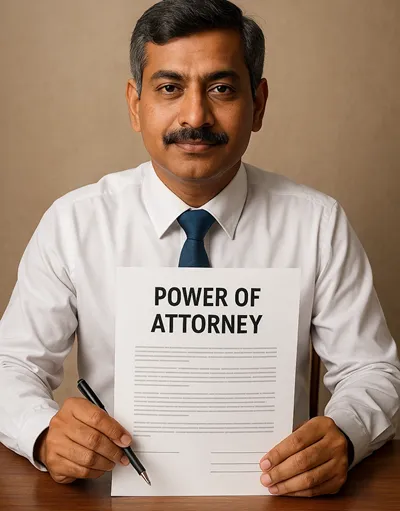
A Power of Attorney (POA) is a legal document that allows one person (the Principal) to authorise another person (the Attorney) to act on their behalf — for signing papers, managing property, or handling legal or financial tasks. It's commonly used by NRIs, elderly people, or anyone unable to be physically present for certain transactions.
Types of Power of Attorney
General Power of Attorney (GPA) – Gives broad powers such as managing property, banking, and legal matters.
Example: An NRI gives GPA to a relative to manage their house in India.
Special Power of Attorney (SPA) – Limited to a specific act.
Example: Signing one sale deed or attending a specific court case.
Durable Power of Attorney (rare in India) – Continues even if the principal becomes mentally incapacitated (commonly used abroad).
Where & How to Apply
Online (available in a few states):
- Some states (like Delhi, Maharashtra, and Karnataka) allow online draft preparation through the State Registration Department portal.
- After drafting, physical signing and registration are still required.
Offline (common method):
- Draft the POA on non-judicial stamp paper (value varies by state).
- Sign the POA in the presence of two witnesses.
- Visit the Sub-Registrar Office (where the property or transaction is located).
- Submit:
- Original and ID proofs of both parties
- Passport-size photos
- Stamp paper and fees receipt
- Two witnesses' IDs
- NRIs: Execute the POA at the Indian Embassy/Consulate, get it attested, and then register it in India within 3 months.
Stamp Duty & Registration Fees
- Varies by state.
- Delhi: ₹100 (for family), ₹500–₹1,000 (if property sale authorised)
- Maharashtra: ₹500 for general use; 1% of property value (max. ₹30,000) if for property sale
- Karnataka: ₹200–₹500 depending on purpose
- Registration fee: ₹100–₹1,000 at the Sub-Registrar Office.
- Notarisation (if not property-related): ₹50–₹200.
Important Points
- Property transfer through GPA is not valid (as per Suraj Lamp Judgement, 2011). A proper sale deed is needed.
- Always prefer Special POA to reduce misuse risk.
- POA ends automatically on the death of the principal or attorney.
FAQs on Power of Attorney
-
1. Who can I give POA to?
-
Any trustworthy adult of sound mind — usually family, friends, or business partners.
-
2. Is registration mandatory?
-
Yes, for property-related POAs. For other purposes, notarisation suffices.
-
3. Can I make a POA from abroad?
-
Yes, at the Indian Embassy/Consulate. Get it attested and register it in India later.
-
4. How long is a POA valid?
-
Till the stated period, till revoked, or till death of either party.
-
5. Can a POA holder sell my property?
-
Only if the POA specifically authorises it, and it's registered.
-
6. How can I cancel a POA?
-
By executing a Revocation Deed, registering it (if earlier registered), and notifying all concerned parties.
-
7. Can I give POA to more than one person?
-
Yes. You can specify if they should act jointly or separately.
-
8. Can my attorney take a loan in my name?
-
Only if that power is clearly mentioned in the POA.
-
9. Is e-POA valid in India?
-
No. Physical document with signature, stamp, and registration is mandatory.
-
10. What happens if my agent misuses the POA?
-
You can revoke it immediately and take legal action for breach of trust or fraud.
Add new comment